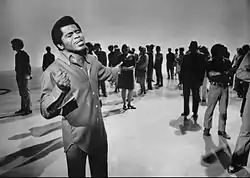The Music Scene (TV series)
The Music Scene is a television series aired by ABC as part of its Fall 1969 lineup, in the Monday, 7:30 to 8:15 timeslot, primarily featuring rock and pop music.
| The Music Scene | |
|---|---|
 James Brown performing on the program, 1969 | |
| Genre | Music chart Variety show |
| Written by | Carl Gottlieb Tony Hendra David Steinberg Richard Schaal Stan Jacobson |
| Directed by | Stan Harris |
| Starring | David Steinberg Chris Bokeno Larry Hankin Paul Reid Roman Christopher Ross Lily Tomlin |
| Theme music composer | Patrick Williams |
| Composer | Patrick Williams |
| Country of origin | USA |
| Original language | English |
| No. of seasons | 1 |
| No. of episodes | 17 |
| Production | |
| Producers | Ken Fritz Stan Harris |
| Production location | ABC Television Center in Hollywood |
| Running time | 45 min. |
| Production companies | Harris/Fritz Productions, in association with ABC |
| Release | |
| Original network | ABC |
| Original release | September 22, 1969 – January 12, 1970 |
Overview
The show had many hosts, with comedian David Steinberg the most frequently-appearing one (Lily Tomlin as well). Many huge names of the era, including James Brown; Crosby, Stills, Nash & Young; Three Dog Night; and Tom Jones on the initial program, and Janis Joplin Bobby Sherman, The Miracles, Sly & the Family Stone, Isaac Hayes, Stevie Wonder, Bo Diddley and Mama Cass Elliot, (who co-hosted as well as performed) among many others, appearing on subsequent shows.
Existing promos initially used to sell this show to ABC affiliates featured the improvisational group The Committee, which featured actor Howard Hesseman (then using the name Don Sturdy), as well as the Rolling Stones. The promos implied that the Stones would be appearing with some regularity on the program. However, The Committee never actually appeared on the show, and neither did the Rolling Stones.
Surprisingly, despite the level of talent presented, this show did not fare well in Nielsen ratings. Advertisers of the era were more interested in shows achieving a mass audience rather than one of primarily younger people who were deemed as having less disposable income than the then-coveted middle aged, middle income viewers that most network programming then targeted. The program was cancelled mid-season. Two DVDs of highlights from the show have been released.
This program and the show that followed it, The New People, are extremely rare examples of U.S. network television programming designed to run for 45 minutes.